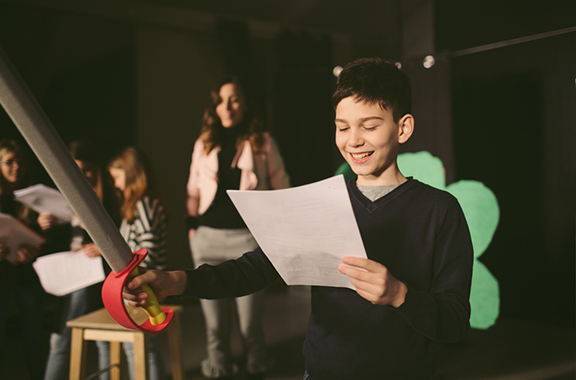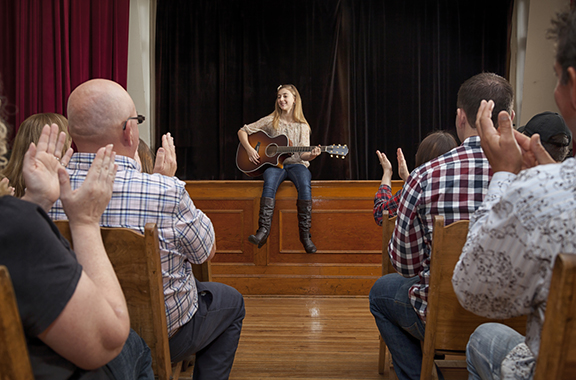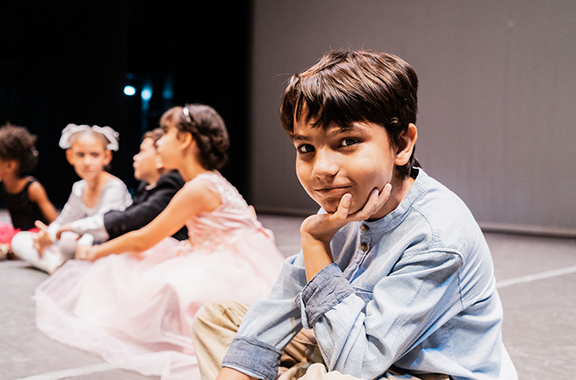Helping a highly sensitive child become more confident
"I can't do it," my seven-year-old daughter whispers to me backstage. She has been rehearsing for a large musical production for over two months now and opening night is about to start. I was worried about this when she got the part (she is a Highly Sensitive Person and an introvert), but practices had been going well so far.
Now there were tears.

"I can't go on stage crying!" She's starting to panic.
The stage manager ushers me away (no extras backstage now) and all I can do is wait nervously in the crowded audience. It's a lot of people. I have no idea if she'll make it past the curtain.
But she does. With a smile. In full character. She's amazing and for the next six nights of performances her confidence just grows and grows.
As a Highly Sensitive Person (HSP) myself, I don't think I'd have the confidence to get up and perform in front of hundreds of people, but both of my HSP children do exactly that. Often!
HSP often struggle with confidence. We can be labelled as shy, slow to warm up, or nervous. But, as my kids have taught me, everyone can overcome these labels and shine with confidence if they have what they need. Even the 15-20% of us who are highly sensitive!
7 Things children need to feel confident especially if they are an HSP
- To understand themselves
Help them understand themselves and their feelings. If they are high sensitivity, teach that it's okay to be an HSP. If your child is shy or lacks confidence, they may have noticed they are different to their peers. They might recognise that they are the only child who is afraid to go on the big slide, the only one who is too scared to perform at school assembly, or that they cry more than other kids. They might even comment on this or feel like there is something wrong with their personality.
When children understand their own unique personality and strengths, they start to feel more confident about their weaknesses. Also, teaching them that all of their feelings are okay, even nervousness, will stop your child feeling like there is something wrong with them.
If you think your child is an HSP, learn about what high sensitivity is and help them to understand what it means. Being an HSP is normal (15-20% of us are) and there are incredibly special traits that come with it. Helping your child to see the positive sides to being an HSP will contribute to how they see themselves and their self-confidence.
- To be heard
HS children or children lacking confidence can take longer to get their ideas out or think through things, and are sensitive to how you respond. If they are interrupted, criticised or if you finish their sentences your child may think their ideas don't matter or are no good. This will influence how they feel about themselves.
They need uninterrupted, non-critical, focused attention. Showing interest in your child's ideas (even if you have a better or more correct idea) is important for their confidence.

- To have confidence modelled to them
Model confidence. Our children are watching us all the time for cues on how to behave in the world. If you are shy or lack confidence they will notice. This could be a good opportunity to challenge yourself! Even if you don't feel confident there is no reason why you can't look it! Work on standing up taller, lifting your head up as you entering a room, making strong eye contact and pushing yourself out of your comfort zone. As you learn more confidence skills this will rub off on your child.
- To have their efforts encouraged
Encourage practice. Praise persistence. Be positive about failures. Kids get confidence and resilience from seeing that they can push through life's challenges. Psychologist Carl Pickhardt talks about teaching your child to say these three things:
"I can do it" (belief in yourself)
"I want to make the effort" (motivating yourself)
"I will give it a good try" (committing yourself to it)And if they fail, that's totally okay! Show them that failure is a healthy, normal part of life.
Confidence comes with repeatedly succeeding, so do make sure the challenge is actually one they can succeed at eventually. If it's not, offer your support.
- Positive thinking and visualisation
Imagining and doing are very similar to the brain. HSP are great at thinking in depth and imagining a situation so you can use this to your child's advantage. They may be imagining all the negative things that could happen in a situation (all those risks), so help them to imagine the positives.
There has been research recently around the power of mentally travelling into the future and imagining some of the great things that might happen.
If your child has a party to go to, talk about and imagine some of the exciting parts - there will be a delicious cake and lots of yummy food, the games will be really fun and everyone will be laughing and having a really good time.
- To solve their own problems
Support them to problem solve for themselves as much as possible. Let them give it a go first before you offer to help. Don't jump in too early. HSP need a bit more processing time (because they process so deeply) so allow them that time.
If your child is nervous for the school play, ask them what they think might help them feel calmer. If they need confidence to talk to someone, see if they can work out a way to start the conversation. Coming up with their own solutions gives children confidence in their abilities.
- To be free of criticism
Teach self-evaluation rather than self-criticism, especially for your HSP teenager. HSP can be highly critical of themselves and self-criticism drives confidence way down. We can also be mindful of our own criticism. If our child or teen makes a mistake, it's important we talk about the behaviour that we didn't like rather than criticise their character. You can give feedback on their actions and how they could do better next time (I'm sure they will have some ideas too), but your child also needs to know you believe in them - that you believe they've got what it takes!
Why HSP kids have an especially hard time with confidence
Some people, including HSP, have a strong Behavioural Inhibition System (our pause to check system). This means that kids who are HSP often take more time than others their age to join in or get used to a situation.
They need time to process everything they are experiencing and decide whether they feel safe enough to take part. In a group situation, a party for example, your HSP child might refuse to leave your side for quite a long time.

Our brains are wired to assess risks
We usually see the risks and threats in a situation far more easily that the rewards. Your HS child's brain is working overtime in this area: assessing the risks and going over every situation.
A party may seem very low risk, but our brains register social threats (being made fun of, making a mistake, not being accepted) as just as scary as physical threats. Will they get laughed at if they don't know the rules of the party game? Will the other kids let them join in? What will even happen at this party?
Because HSP are also very tuned in to emotions, being rejected or embarrassed is a much bigger deal.
Confidence is not easy, but it is possible
Whether they are joining in at a party or performing on stage, confidence is not an easy thing to master for anyone. For HSP it is even more of a challenge.
The good news is, no matter how shy or nervous they are, it is possible to help our children develop confidence.
Self-confidence (what we think and feel about ourselves) is important for communication, relationships, reaching goals, and for future career success. So when we support our children to grow in confidence, we are helping them develop skills that will benefit them for the rest of their lives.
Remember too, it's normal and okay for your HSP child to not be confident all the time! It's important to feel a wide range of feelings and to be scared, anxious, or nervous sometimes.
Article by Kelly Eden
Posted 20 September, 2019
Published by The Natural Parent Magazine
- enquiries@schooltv.me
- •
- +61 3 8538 1644
- •
- Ts & Cs
- •
- Privacy Policy
- •
- Get Alerts
- •
- © 2026 SchoolTV ANZ Pty Ltd

